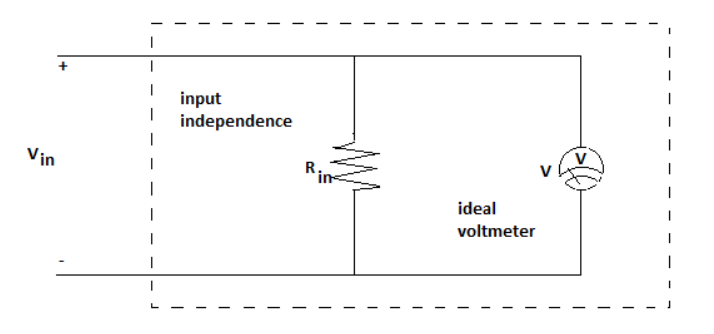
An Ideal voltmeter has
A. Low Resistance
B. High Resistance
C. Infinite Resistance
D. Zero resistance
Answer
598.8k+ views
Hint: An ideal voltmeter is one which has infinite resistance. When the resistance is infinite, the voltmeter draws no current and hence, gives accurate readings of voltage. And the internal resistance of an ideal ammeter is zero.
Complete step-by-step answer:

Resistance: Resistance is a measure of the opposition of current flow in an electric circuit. Resistance is measured in ohms, symbolized by the Greek letter omega$\Omega $.
A voltmeter is an instrument used for measuring electric potential difference between two points in an electric circuit. The main principle of voltmeter is that it must be connected in parallel in which we want to measure the voltage.
Parallel connection is used because a voltmeter is constructed in such a way that it has a way that it has a very high value of resistance.
An ideal voltmeter has infinite impedance, no capacitance, whatever and makes perfect readings of voltage.
Properties of an ideal voltmeter:
1. Infinite impedance
2. High Sensitivity
3. High Accuracy
4. No zero error
5. No temperature dependence
6. Fast response time
7. Good resolution
Since Voltmeter is connected in parallel with the element whose voltage is going to be measured, for an ideal voltmeter no current should flow through it, all current should pass through the connected resistance so that its voltage can be accurately measured by voltmeter. For no flow of current through voltmeter, we need infinite resistance.
Note: Ammeter is connected in series and voltmeter is connected in parallel with the electric appliance. Today’s lab voltmeters and even handheld DVM or DMMs come very close to ideal with very high impedances. The DC meters can be had with 5.5 6.5 digits and more resolution.
Complete step-by-step answer:

Resistance: Resistance is a measure of the opposition of current flow in an electric circuit. Resistance is measured in ohms, symbolized by the Greek letter omega$\Omega $.
A voltmeter is an instrument used for measuring electric potential difference between two points in an electric circuit. The main principle of voltmeter is that it must be connected in parallel in which we want to measure the voltage.
Parallel connection is used because a voltmeter is constructed in such a way that it has a way that it has a very high value of resistance.
An ideal voltmeter has infinite impedance, no capacitance, whatever and makes perfect readings of voltage.
Properties of an ideal voltmeter:
1. Infinite impedance
2. High Sensitivity
3. High Accuracy
4. No zero error
5. No temperature dependence
6. Fast response time
7. Good resolution
Since Voltmeter is connected in parallel with the element whose voltage is going to be measured, for an ideal voltmeter no current should flow through it, all current should pass through the connected resistance so that its voltage can be accurately measured by voltmeter. For no flow of current through voltmeter, we need infinite resistance.
Note: Ammeter is connected in series and voltmeter is connected in parallel with the electric appliance. Today’s lab voltmeters and even handheld DVM or DMMs come very close to ideal with very high impedances. The DC meters can be had with 5.5 6.5 digits and more resolution.
Recently Updated Pages
Master Class 12 Economics: Engaging Questions & Answers for Success

Master Class 12 Physics: Engaging Questions & Answers for Success

Master Class 12 English: Engaging Questions & Answers for Success

Master Class 12 Social Science: Engaging Questions & Answers for Success

Master Class 12 Maths: Engaging Questions & Answers for Success

Master Class 12 Business Studies: Engaging Questions & Answers for Success

Trending doubts
Which are the Top 10 Largest Countries of the World?

What are the major means of transport Explain each class 12 social science CBSE

Draw a labelled sketch of the human eye class 12 physics CBSE

Why cannot DNA pass through cell membranes class 12 biology CBSE

Differentiate between insitu conservation and exsitu class 12 biology CBSE

Draw a neat and well labeled diagram of TS of ovary class 12 biology CBSE




